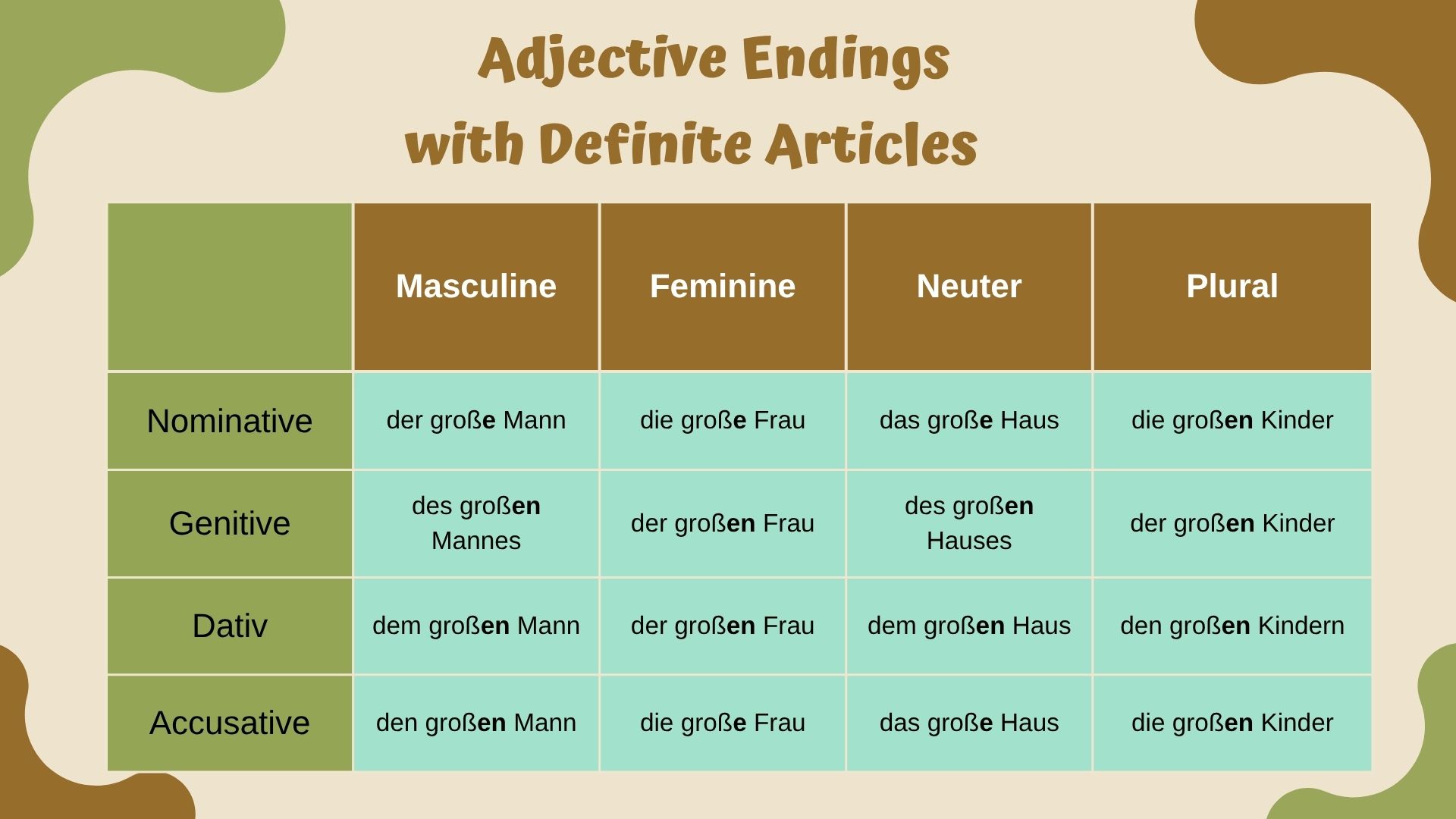Table of Contents
Introduction
German adjective declension changes the ending of the adjective based on factors such as case, gender, and number. When using definite articles (der, die, das), these endings follow specific patterns. In this article, we focus on adjective endings with definite articles. For a broader overview of German adjective endings, check out our page on German Adjectives endings.
Table of German Adjective Declension with Definite Articles
Below is a chart for the adjective klug (clever) with der, die, das forms in all four cases. Notice the adjective endings in bold:
| Masculine | Feminine | Neuter | Plural | |
|---|---|---|---|---|
| Nominative | der kluge Mann | die kluge Frau | das kluge Kind | die klugen Menschen |
| Genitive | des klugen Mannes | der klugen Frau | des klugen Kindes | der klugen Menschen |
| Dative | dem klugen Mann | der klugen Frau | dem klugen Kind | den klugen Menschen |
| Accusative | den klugen Mann | die kluge Frau | das kluge Kind | die klugen Menschen |
Remember that masculine and neuter words in the genitive case typically add an -s or -es to the noun (e.g., Mannes, Kindes). Pay attention to these endings, as they work alongside the adjective endings.
Example Sentences with Definite Articles
Here are some sentences showing how these forms appear in context:
| German | English |
|---|---|
| Der kluge Mann liest jeden Tag. | The clever man reads every day. |
| Ich schätze die kluge Frau sehr. | I value the clever woman a lot. |
| Wir beobachten das kluge Kind im Park. | We observe the clever child in the park. |
| Die klugen Menschen diskutieren über Politik. | The clever people are discussing politics. |
| Ich habe Fragen zu den klugen Ideen dieses Mannes. | I have questions about this man’s clever ideas. |
| Sie hilft dem klugen Kind bei den Hausaufgaben. | She helps the clever child with homework. |
Adjective Endings Quiz Practice

Practice is essential to master German adjective endings. You can test your knowledge with our free quiz on
German adjective endings. This quiz focuses on using adjectives in context and helps you gauge your progress.
Tips and Tricks
- Memorize the Basic Patterns: Notice that masculine, feminine, neuter, and plural share similar -e and -en endings. Observing patterns across the cases helps you remember them faster.
- Focus on Gender and Case: Identify whether the noun is masculine, feminine, neuter, or plural. Then apply the correct ending based on the case (nominative, genitive, dative, accusative).
- Consistent Practice: Create your own sentences. The more you write and speak using these endings, the easier it becomes to recall them automatically.
- Combine with Other Grammar Skills: If you need a broader grammar overview, consult our
German grammar overview for additional context.
Conclusion
Mastering German adjective endings with definite articles helps you express yourself with clarity and precision. By noticing the patterns in each case and gender, and by practicing them in context, you’ll build a strong foundation. Keep exploring more sentences, and doing quizzes. With practice, selecting the right ending will feel more natural, helping you speak German with better fluency and confidence.
FAQ
Why do I need to learn these endings?
Adjective endings show how nouns relate to each other in a sentence.
Do these endings change if the article changes?
Yes. Different article types (indefinite, possessive pronouns, etc.) can affect adjective endings. Here, we focus on definite articles (der, die, das).
How can I improve beyond memorizing charts?
Practice writing and speaking. Also read German texts and note how adjective endings change in different cases.
Where can I practice adjective endings?
Try our German adjective endings quiz for hands-on exercises and instant feedback.

